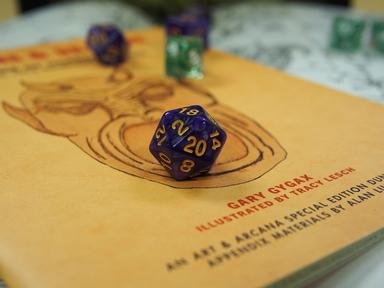Quiz Answer Key and Fun Facts
1. Let's first start with the material belongings: To be a Dungeon Master, you need some polyhedral dice, a way to take notes and the rulebooks. According to the official rules, a Dungeon Master needs the Player's Handbook, the Dungeon Master's Guide and which third book?
2. You could start your campaign with a purchased adventure module, but you would prefer to rather create your own so you can better tailor it to your players' characters. Which of these components is the LEAST necessary for a good introductory adventure for a new party?
3. You are preparing a single-opponent combat encounter for a party of four third level characters. You wish for this encounter to be a major plot point of your adventure, with a sizable reward. Which challenge rating should the monster you use in designing this combat have?
4. You have now completed your adventure and are ready for your first session as Dungeon Master. Your players arrive and give you their character sheets for cross-checking except for one player who did not bring a character. What would be your best course of action now?
5. A few adventures into the campaign, you have included a creature several levels above what the characters can manage to deter them from a specific path. In the middle of an intricate storyline involving careful diplomacy, the characters foolishly decide to attack and try to kill it (which is bound to epically fail). What would be a good way to resolve such a situation (for the first time in the campaign)?
6. Having learned from their latest mishaps, the player characters do some careful and time-consuming research before venturing into the lair of a red dragon. They stock up on fire resistances and healing items, making the dragon an easy opponent. What should you modify about this encounter to cope with the situation?
7. Three hours before the session, one player calls in sick, depriving the party of its only healer. You are in the middle of a storyline involving heavy combat and the reduced party would have almost no chance of reaching their goal. Which would NOT be a good way to deal with this situation?
8. Mistakes can happen: You have handed out a magical item to a character that is far too strong for the current party balance. It has already been used several times to overcome carefully planned encounters. How do you IDEALLY rectify this situation (it may not always be possible)?
9. As your game develops over weeks and months, it becomes apparent that there is tension in your group: Three of the four players prefer serious, combat-oriented play while the fourth, playing a bard, wants more character interaction and humor. Everyone however agrees they still want to continue playing together. How do you best adapt the game?
10. A fifth player has joined your group and the first sessions went well. However, after a while, things go downhill. The new player is hogging the spotlight, acting out of turn and refusing to go with any idea that was not his. His character has recently stolen equipment from two other party members as well without an in-character motivation. What should be your FIRST step in resolving this crisis?
Source: Author
WesleyCrusher
This quiz was reviewed by FunTrivia editor
ozzz2002 before going online.
Any errors found in FunTrivia content are routinely corrected through our feedback system.

